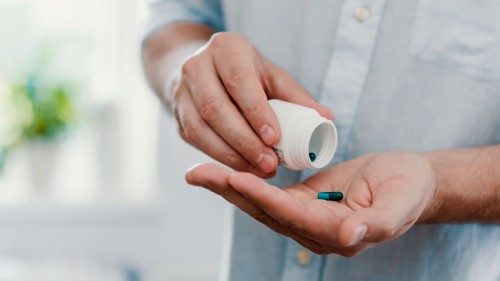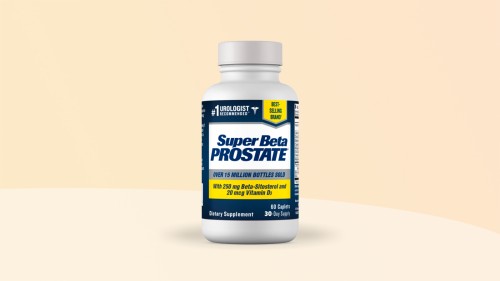Force Factor Prostate Review: Is It Safe and Effective?
Last Updated on April 19, 2021
Medically Reviewed by Anthony Dugarte, MD
Force Factor Prostate contains a mix of essential nutrients and plant-based ingredients to promote prostate health and reduce BPH symptoms. It contains more helpful ingredients than its competitors and may help improve symptoms.


|
Pros
|
Cons
|
What Is Force Factor Prostate?
Force Factor Prostate is a supplement designed to help with the symptoms of benign prostatic hyperplasia (BPH) – otherwise known as an enlarged prostate gland.
BPH is not necessarily cancer, though it may have some of the same symptoms.
BPH symptoms include increased urination at night, weak urine stream, inability to empty the bladder, urinary urgency, and difficulty starting to urinate.
Force Factor has three major parts to its supplement to support prostate health:
- A blend of trace minerals, including zinc, selenium, copper, manganese, and molybdenum.
- Prostate Size Support Matrix, which includes saw palmetto extract, vanadium, and boron.
- Flow Enhancement Complex of stinging nettle extract, beta-sitosterol, pumpkin seed oil, and African plum tree extract.
Together, these ingredients are claimed to increase urinary flow, maintain normal prostate size, and relieve urinary urgency.
Two former Harvard University rowers founded Force Factor as a global performance nutrition brand.
They utilize a science and quality team for product innovation, research and development, and quality control.
Evaluation of Ingredients
Zinc (Zinc Oxide), 15 mg
Zinc is a necessary mineral for metabolism in all cells, but it is found in extremely high levels in the prostate gland compared to other tissues in the body.
Zinc levels in the prostate are noted to be decreased in BPH and prostate cancer, and moderate zinc supplementation and intake may be beneficial for prostate health. (1, 2)
There are currently few studies on the effects of zinc supplementation as a protective measure against BPH, and more studies should be completed to determine the strength of this effect.
Selenium (Selenium Amino Acid Chelate), 60 mcg
Selenium is a trace mineral commonly found in Brazil nuts, seafood, meats, cereals and grains, and dairy products.
It has antioxidant and anti-inflammatory effects, is needed for reproduction, and can reduce the risk for autoimmune thyroid disease. (3)
Research suggests that selenium supplementation may have a protective role against prostate cancer and its progression, especially if dietary intake is insufficient. (4)
Manganese (Manganese Amino Acid Chelate), 1 mg
Manganese is an essential trace mineral needed for energy production and as an antioxidant.
In one epidemiological study, serum levels of manganese were significantly lower in men with prostate cancer than men without prostate cancer. (5)
Another study found that manganese supplementation during radiation inhibited prostate cancer growth and protected normal prostate tissue against damage in rats implanted with tumors. (6)
Molybdenum (Molybdenum Amino Acid Chelate), 60 mcg
Molybdenum is a trace mineral that is not often discussed but is found in legumes, nuts, leafy vegetables, dairy, cereal grains, and beef liver. (7)
Research with cancer cells suggests that molybdenum used in targeted treatment may be helpful in cancer treatment. (8)
Saw Palmetto
Saw palmetto extract comes from the berries of a small palm tree that is native to the Southeastern United States.
It is a supplement that is commonly used for BPH treatment. One type of saw palmetto extract called Permixon, which has over 80% free fatty acids, was found to have consistent prostate effects compared to other saw palmetto extract types. (9)
Permixon was found to improve urinary flow, decrease prostate cancer growth, and reduce nightly urination.
It also helped decrease inflammation of the prostate and improved testosterone metabolism.
The side effects of saw palmetto are generally mild but may include abdominal pain, diarrhea, nausea, headache, fatigue, decreased libido, and rhinitis.
Vanadium (Vanadyl Sulfate)
Vanadium is a mineral often used as a supplement; it may have potential as a pharmaceutical anti-cancer drug.
Cell studies find that vanadium may decrease the growth and spread of cancer cells and support immune function by being an antioxidant. (10)
Boron (Boron Amino Acid Chelate)
Boron is a trace mineral needed for metabolism.
Research finds that boron can improve the body’s use of testosterone, reduce inflammation, protect against oxidative stress, and be therapeutic in the prevention and treatment of prostate cancer. (11)
Stinging Nettle Root Extract
Stinging nettle is a perennial flowering plant known for being covered in hair-like needles that can cause a sting and rash on the skin if touched.
An animal study involving rats with testosterone-induced BPH found that stinging nettle extract helped reduce prostate size, increased urine output, and reduced prostate-specific antigen (PSA) levels. (12)
Stinging nettle may cause mild side effects, including skin irritation, gastrointestinal upset, and sweating.
Beta-Sitosterol
Beta-sitosterol is a phytosterol that has a structure similar to cholesterol but with health benefits.
One study found that beta-sitosterol combined with resveratrol reduced reactive oxygen species levels in prostate cells and prevented cancer cell growth. (13)
A review of studies found that beta-sitosterols decreased nocturia, improved urine flow, and decreased urinary retention but did not decrease prostate size. (14)
Side effects of beta-sitosterol are mild and similar to those of placebo but may cause gastrointestinal upset in some people.
Pumpkin Seed Oil
Pumpkin seeds contain sterols, tocopherols (vitamin E), omega-6 and omega-9 fatty acids, zinc, and other nutrients.
While pumpkin seed oil extract does not reduce prostate size, it can help improve symptoms of BPH. (15)
African Plum Tree Extract
African Plum Tree extract, also known as pygeum, is used for the treatment of BPH.
It mainly works through decreasing the activity of 5-alpha reductase and through anti-inflammatory activity. (15)
A review suggests that African plum extract may help improve urinary flow rate and symptoms of BPH. (16)
Side effects of pygeum in the studies were mild and similar to those reported with placebo.
Support for Claimed Benefits
Below is our summary of the available evidence for the claimed benefits of Force Factor Prostate based on the available research:
| Increases urinary flow | 3/5 |
| Maintains normal prostate size | 3/5 |
| Relieves urinary urgency | 3/5 |
Side Effects, Safety, and Dosage
To take Force Factor Prostate, you only need to take 2 softgels daily with food.
This supplement is intended for adult use only and should not be used by children.
Some ingredients in this supplement may have interactions with certain medications and cause side effects.
For most of the herbal ingredients, the most common side effects are mild and include gastrointestinal symptoms but may include headaches, skin irritation, and sweating.
Excessive intake of trace minerals can lead to toxicity and adverse side effects. (17)
The most common side effects include gastrointestinal symptoms but also include increased inflammation and reactive oxygen species, gout formation, adverse neurological effects, ischemia, and increased risk of death.
Saw palmetto should not be taken if you take blood thinners (such as warfarin or Plavix) or other BPH medications (including finasteride).
Stinging nettle may also interact with blood-thinners, medications for hypertension, diuretics, anti-hyperglycemic medications, and NSAIDs.
I strongly recommend consulting with a physician before taking this supplement, especially if you take other medications or have health conditions, due to the possible medication and condition interactions.
Cost and Where to Buy
Force Factor Prostate is not sold through its website but is easily found at local and online retail stores.
Some locations where you can purchase this supplement include GNC, Amazon, Walmart, Kroger, CVS, Walgreens, and The Vitamin Shoppe.
Force Factor Prostate is sold in 60 softgel bottles (a 1-month supply) and costs $29.99. If purchased through an Amazon subscription, you can get this supplement for $24.94.
Returns can only be made within 30 days if your product is unopened and in the original packaging.
You have to call a customer helpline to obtain a Return Merchandise Authorization number for your return to be accepted. Shipping costs are not included in your refund.
Given the list of ingredients included in this supplement, it appears to be worth the cost.
However, I would prefer knowing that these ingredients are in doses shown to be effective for BPH, but that is a limitation of all proprietary blends.
How It Compares
As far as prostate health supplements go, Force Factor Prostate is priced fairly compared to its competitors.
Cheaper prostate health supplements are focused on only one ingredient (such as stinging nettle or saw palmetto). And the more expensive brands contained other anti-inflammatory ingredients such as fish oil or green tea.
One thing that does set Force Factor Prostate apart from its competitors is the inclusion of trace elements, including zinc, manganese, selenium, and molybdenum – which I did not find in some of the other popular supplements.
Related: Best Prostate Health Supplements of 2022
The Bottom Line
Overall, Force Factor Prostate appears to be a moderately priced supplement containing several ingredients that are supported to help with prostate health and may improve symptoms of BPH.
It is important to note that some of the ingredients (trace minerals) only appear to be effective if you are already deficient in them, so the supplement’s efficacy may not be too high for certain people.
In addition to this, this supplement does contain ingredients that have known medication interactions.
Given that the population at risk for BPH may be taking additional medications, Force Factor Prostate may not fit into their routine.
If you are experiencing any urinary symptoms, consult a medical professional for advice before starting any new supplement or treatment.
These symptoms may be related to more serious causes other than BPH and should be screened for as soon as possible to get the proper treatment.
A Word from Our RD
To support your prostate health, focus on an anti-inflammatory diet. A common note in many of the ingredients in prostate health supplements is the reduction of inflammation.
To optimize an anti-inflammatory diet, it is important to consume a variety of antioxidant-containing foods.
The easy way to remember this is to get a “rainbow” of fruits and vegetables throughout your week to provide various phytochemicals and antioxidants to your body.
Intake of omega-3 containing foods such as fatty fish, nuts and seeds, olive oil, and avocado can also support protection against oxidation.
Culinary spices, including turmeric, cayenne pepper, and rosemary, can be added to dishes for additional flavor and antioxidants.
To round out a healthy anti-inflammatory diet, limit red meat consumption, excessive caffeine, alcohol, and sodium in the diet.
You can speak with your physician or a registered dietitian to determine what other lifestyle changes and treatments can help you reduce inflammation, get adequate nutrition, and support your prostate health.
At WellnessVerge, we only use reputable sources, including peer-reviewed medical journals and well-respected academic institutions.
- Zinc status of patients with benign prostatic hyperplasia and prostate carcinoma:
https://www.ncbi.nlm.nih.gov/pmc/articles/PMC3114577/ - Zinc Deficiency in Men Over 50 and Its Implications in Prostate Disorders:
https://www.frontiersin.org/articles/10.3389/fonc.2020.01293/full - Selenium and human health:
https://pubmed.ncbi.nlm.nih.gov/22381456/ - The association between Selenium and Prostate Cancer: a Systematic Review and Meta-Analysis:
https://www.ncbi.nlm.nih.gov/pmc/articles/PMC6103565/ - significantly lower:
https://www.ncbi.nlm.nih.gov/pmc/articles/PMC7206590/ - Serum Levels of Selenium, Zinc, Copper, Manganese, and Iron in Prostate Cancer Patients:
https://pubmed.ncbi.nlm.nih.gov/29370088/ - Molybdenum:
https://ods.od.nih.gov/factsheets/Molybdenum-HealthProfessional/ - Steering Efficacy of Nano Molybdenum Towards Cancer: Mechanism of Action:
https://link.springer.com/article/10.1007/s12011-019-01742-2 - Use of saw palmetto (Serenoa repens) extract for benign prostatic hyperplasia:
https://www.ncbi.nlm.nih.gov/pmc/articles/PMC6859144/ - Synthesis, immunomodulation and cytotoxic effects of vanadium (IV) complexes:
https://pubmed.ncbi.nlm.nih.gov/23876231/ - Nothing Boring About Boron:
https://www.ncbi.nlm.nih.gov/pmc/articles/PMC4712861/ - Ameliorative effects of stinging nettle (Urtica dioica) on testosterone-induced prostatic hyperplasia in rats:
https://pubmed.ncbi.nlm.nih.gov/21806658/ - Effect of resveratrol and beta-sitosterol in combination on reactive oxygen species and prostaglandin release by PC-3 cells:
https://pubmed.ncbi.nlm.nih.gov/15664307/ - Beta-sitosterols for benign prostatic hyperplasia:
https://pubmed.ncbi.nlm.nih.gov/10796740/ - Phytotherapy of benign prostatic hyperplasia. A minireview:
https://pubmed.ncbi.nlm.nih.gov/25165780/ - Phytotherapy for Lower Urinary Tract Symptoms Secondary to Benign Prostatic Hyperplasia:
https://www.auajournals.org/doi/10.1016/j.juro.2008.01.094 - Trace elements in human nutrition (II) - an update:
https://www.ncbi.nlm.nih.gov/pmc/articles/PMC6993532/





